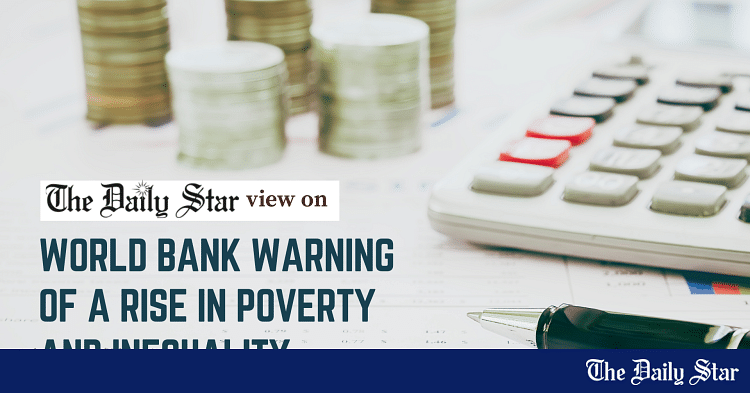Warnings from World Bank should be taken seriously
VISUAL: STAR
“>
VISUAL: STAR
A new World Bank report has rightly sounded the alarm about a potential rise in poverty and inequality in Bangladesh—warnings that policymakers can ill afford to ignore. According to the report, persistent inflation, job losses, and a slowing economy may further erode household welfare, intensifying our already pressing economic challenges.
The national poverty rate is projected to rise to 22.9 percent in 2025, up from 18.7 percent in 2022. Meanwhile, the share of people living in extreme poverty—defined as those earning less than $2.15 a day—is expected to nearly double to 9.3 percent, pushing an additional three million people into this category. In the latter half of 2024 alone, nearly 4 percent of workers reportedly lost their jobs, while wages declined by 2 percent for low-skilled workers and by 0.5 percent for high-skilled workers. The labour market, in short, is showing clear signs of distress. Notably, the labour force participation rate has dropped from 60.9 percent to 59.2 percent, driven largely by a sharp decline in female participation, from 41.6 percent to 38.9 percent.
Exacerbating the crisis is the prolonged spell of high food inflation, a key driver of poverty that has continued to squeeze household budgets. Real wages have been in decline for over 40 months now, as nominal wage growth consistently lags behind soaring prices. The Gini index, a key measure of income inequality, is also projected to rise from 33.4 in 2022 to 36.1 in 2025, with experts pointing to the weak and informal nature of the labour market as a primary cause.
A lack of quality employment opportunities has left a vast segment of the population engaged in low-productivity, self-employed work, with limited earning potential. What makes this situation even more troubling is that GDP growth has been slowing in recent years—driven by falling investment, policy uncertainty, high borrowing costs, and political unrest—resulting in fewer jobs and lower confidence in the economy. In light of these trends, it is imperative that policymakers, political parties, and other stakeholders come together and take decisive steps to reduce uncertainty and improve the investment climate.
To this end, it is crucial to undertake necessary structural reforms urgently. This includes urgent banking and fiscal reforms aimed at restoring investor confidence and accelerating economic recovery. Frequent policy shifts and uncertainties that deter businesses from investing and expanding must also be addressed head-on. The government, in consultation with political parties, must also provide clarity on the timing of the next elections and work towards a consensus that reassures both domestic and foreign investors that Bangladesh will not remain trapped in political uncertainty indefinitely.




